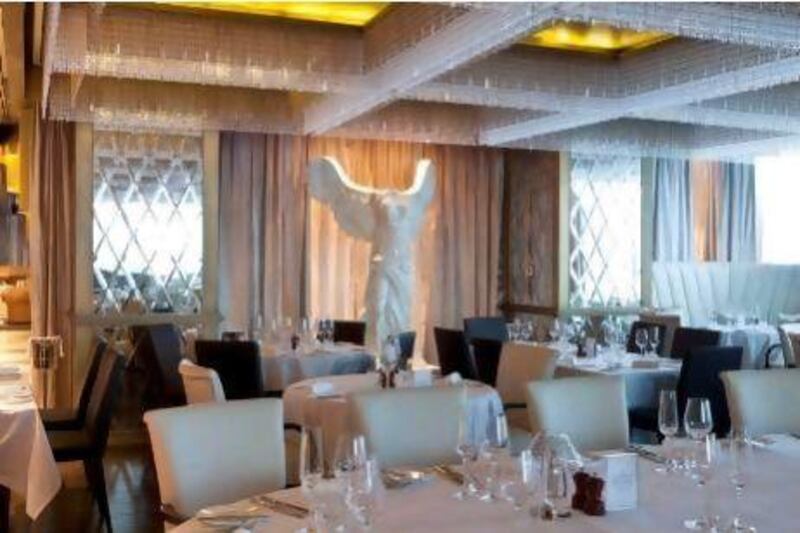Marco Pierre White is, quite simply, a legendary chef. When he won his third Michelin star at Restaurant Marco Pierre White in 1995, at 33, he became the youngest chef ever to do so and the first Briton. Within the culinary world, his cookbook White Heat is regarded as a seminal piece of work.
We spoke to him during his recent visit to Dubai for the launch of Titanic by Marco Pierre White at the Melia Dubai. As well as our own questions, we asked a number of chefs based in the UAE and further afield to come up with some questions for the renowned chef.
Reif Othman, the executive head chef at Zuma, Dubai, asks: "Why did you choose Dubai to open a restaurant? Why not Australia, London, Canada?"
"I like the Middle East. It's close to home. I'm not one of those individuals who wants to go to Australia, America, South Africa and wherever else around the world. This suits me fine. The UAE is seven hours away so I can easily come here and visit my restaurants."
Nathan Outlaw, the chef proprietor of the two Michelin-starred Restaurant Nathan Outlaw in Cornwall, asks: "If you hadn't become a chef, what would you have done instead?"
There was no other option. When I was a young chef, coming back from an interview, I missed the last bus home. So I walked the streets of London all night and I came to this smart, glamorous restaurant which turned out to be Le Gavroche. The next morning, I went back and knocked on the door and asked Albert Roux for a job. Had I not missed my coach, had I not walked down that road, had I not had the tenacity to go back in the morning – it was fate.
There's a saying that goes: "The happiest days of a boat owner's life are the day they buy the boat and the day they sell the boat." The National asks: "Does that apply to the winning and giving back of Michelin stars?"
It was the most exciting journey of any chef's life to win Michelin stars. In 1995, when I won three stars, I realised my dream and I'm so glad that happened when I was a young man. But did cooking make me happy? No, of course not. And later I came to the question: if you put a price on Michelin stars, what are they really worth? What is Michelin anymore?
Tom Kitchin, the Michelin-starred chef proprietor of The Kitchin in Edinburgh, asks: "When you were working on it, did you have any inkling that White Heat would inspire a whole generation of chefs?"
No, of course not. Bob Carlos Clarke [the photographer responsible for the shots] was my very good friend. After I won two stars, the media became fascinated with me: the boy with the long hair who smoked Marlboro. I don't think or question why things happened; they just did. It was Bob Carlos Clarke's photographs – particularly the one with the fag hanging out of my mouth, where I look completely exhausted – that captured people's attention. It's not like that anymore.
The National asks: "Do you think that it's a shame that life in a kitchen isn't as tough as it used to be?"
I came from the old world of gastronomy. The boys who walked into that world came from very hard backgrounds. Therefore, being given a hard time was the norm, being shouted at was the norm, waking in the morning and feeling ill, feeling tired, was the norm. You never asked how many hours you were going to work or what your salary was going to be. If you put boys who work in kitchens today into that world, they would be horrified, but the point is that they'll never see it and I'm glad I did.
Nick Alvis, the chef proprietor of Table 9 in Dubai, asks: "Who would you personally rate as an amazing cook at the top or soon to be at the top of his or her game?"
There are lots of very gifted chefs in Britain today, but whether they are being given the recognition that they deserve is another question. I hear very good things about Tom Kitchin; Brett Graham [the head chef at the two Michelin-starred restaurant The Ledbury in London] is a proper chef, as is Jason Atherton. He [Atherton] used to work for me – it was the hardest time of his life. Now he's grown up, he's hard himself.
Mark Sargeant opened Gordon Ramsay at Claridges, where he won a Michelin star. He now oversees Rocksalt Restaurant and The Smokehouse in Kent. He asks: "Do you ever miss the old days? Deep down, do you sometimes want to just do one service, like a Friday night at Harvey's again?"
No, you can never go back. You can never relive a memory. The magic has gone, the world has changed – we have changed. You have to accept life for what it is and be thankful for being part of the industry at that period of time in your life, to have been given the opportunities that I was given, to have worked with the people I did.
The National asks: "Why did you hand your Michelin stars back when you did?"
Michelin is not the most important thing in the world and what gave me the strength to walk away from it all was that I was being judged by people that had less experience than me. I walked away with my integrity intact and today, if I want to open a business in Dubai or work with a certain company, then I can do that, because I'm not trying to pretend to be something that I'm not. You look at modern-day chefs and they're being pulled away from behind their stoves. I never wanted to live a lie.











